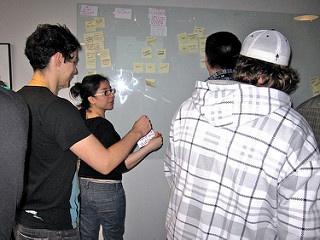
(Photo credit: VFS Digital Design)
In other articles, I have frequently discussed the dangers of what we think we know. There are times that we think we know and understand things about how our business or industry operates, and those things we think we know may be inaccurate and stymie our innovation and stop our efforts at improvement.
However, in this article, I want to particularly speak to those businesses that operate in a project context and undertake project management on a routine basis.
Organizations that do projects (e.g., IT projects, construction projects, engineering projects, or even engineer-to-order) frequently display very similar behaviors and symptoms. Here are some of them:
- Priorities change frequently—sometimes, on the worst days, several times a day
- People get shifted too frequently from one project to another
- Resources are forced into inefficient multi-tasking mode in an effort to appease multiple (internal or external) customers
- Projects tend to fall further and further behind schedule with no foreseeable opportunity for recovery
These are all symptoms of an organization that simply has too many active projects with no buffers to absorb variability or the negative affects of “Murphy,” when he shows up.
What are some of the things we don’t know that hurt us?
When attempting to manage multiple overlapping projects (i.e., a project management office or project portfolio management):
- We frequently lack data to know how to properly stagger projects to avoid overloading critical project resources or skill sets.
- Similarly, most have no toolset by which to do what if scenarios with pending (un-released) projects to see what the impacts might be on future resource loading or cash flows.
All too frequently, our multi-project management degrades into nothing more than appeasement management. We have fixed rules for setting priorities. Instead, priorities are set by the customers (again, internal or external) who manage to raise the biggest fuss, make the loudest demands, or the strongest threats. In the absence of a clear and consistent set of priorities for managing multiple projects, we actually have no way of clearly knowing the following:
- Which of the current set of active tasks are most endangering the projects’ successful and timely completions?
- Of those tasks that are ready to be assigned, but not yet assigned to a specific resource, which are most urgent?
- And, of those tasks that cannot yet be assigned (because they are contingent on some other task or event), which are most likely to endanger the successful and timely completion of the projects with which they are associated?
Our multi-project management systems aren’t doing the job
Because our project management systems (if we have one) are disjointed, disconnected, and frequently just plain hard to use and update, senior managers are unable to ask cogent questions about the status of any given project—let alone the affects of that project on other projects in the portfolio.
As a direct result, those responsible for projects often find themselves discovering that a project is in trouble only after it is too late to take any meaningful corrective action.
This, of course, triggers yet another round of changing priorities, reassigning resources and forcing the workers into more debilitating rounds of task-switching and wasteful multi-tasking. Focus becomes nearly impossible to achieve at any level.
Managers and executives are no longer focused on clear project priorities. Their focus has been shifted almost entirely to appeasement of the customers awaiting their overdue projects and quelling fears—mostly real, some imagined—of cost overruns.
And, the folks doing the work: their focus is lost in constant rounds of task-switching and time lost in trying to keep their minds clear as they are required to move from project to project on a not-so-merry-go-round of trying to keep their managers happy by making a little progress on every project and task that has been handed to them.
There must be a better way
If nothing else—if this is our experience—it should plainly show us that there must be a better way. What we don’t know is hurting us.
We would like to hear from you on this topic. What is your experience? Please leave your comments here, or feel free to contact us directly, if you’d rather.




